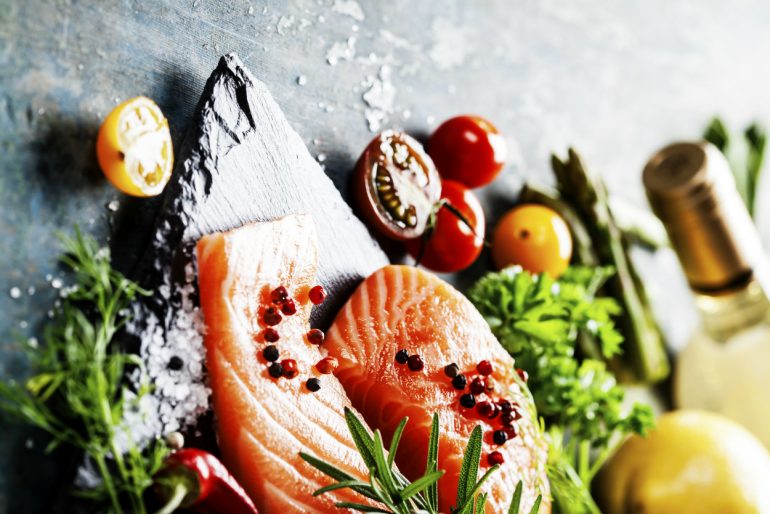These 13 foods and ingredients promote a healthy brain
As we continue to learn more about the gut-brain health connection, and the link between inflammation and brain health, it turns out that many of the same nutrient dense foods we enjoy to fuel our bodies and protect against chronic disease are also working their antioxidant and anti-inflammatory impact or benefit on our brains — improving our cognitive performance, enhancing memory and reducing risk of neurodegenerative disorders including dementia and Parkinson’s.
So when we feed ourselves whole, nutritious foods, we are truly empowering our bodies from head to toe!
Here’s a list of top foods for brain (and overall) health.
Salmon
Salmon, particularly wild-caught and organic salmon (farmed salmon can have significant levels of mercury and other toxins), also contains a rich supply of omega-3 fatty acids to reduce brain fog and improve memory.
Bone Broth
Touted as a superhero for healing gut and brain, bone broth is an ancient food with many health benefits, from enhancing the immune system and reducing intestinal inflammation, to improving joint health and boosting memory.
Green, leafy vegetables
We already know that eating our veggies is good for us. And now a growing body of research suggests that green, leafy vegetables such as kale, Swiss Chard and spinach can help prevent or onset of dementia too. Also reach for bok choy, Romaine lettuce, turnip greens and parsley, the more the better. Choose a green leafy food at least once every day.
Broccoli
Another green vegetable that packs a nutrient punch for brain health is broccoli. It has a high level of choline to keep memory sharp. As well it’s high in Vitamin K and Vitamin C.
Beets
These colourful root vegetables have many antioxidant properties. Since beets lose some of their nutrients during cooking, beet juice has been suggested as a healthier way to reap their considerable health benefits, which include boosting blood flow to the brain to include and aid in mental performance overall. Try it blended with other juices or include in dairy-free smoothies.
Olive Oil
Extra virgin olive oil (EVOO) has significant anti-inflammatory and brain health benefits. Studies have suggested it may improve learning and memory, as well as protecting against proteins that can lead to the onset of Alzheimer’s. To protect the integrity of the oil, eat it at room temperature — great drizzled on vegetables and pasta, as well as a staple in salad dressings.
Coconut Oil
Touted for its versatility and many health benefits, coconut oil is a potent anti-inflammatory. It also helps to eliminate unhealthy gut bacteria. Add it to smoothies, cook safely with it at higher temperatures (there are versions with and without the coconut-y taste, depending on your preference), and even eat a tablespoon a day on its own.
Blueberries
One of the most antioxidant-rich foods on the planet, blueberries are loaded with phytonutrients that support brain health. In particular, their high levels of gallic acid help protect the brain against stress and degeneration.
Avocados
Rich in nutrients, the avocado (actually a berry) contains high amounts of monounsaturated fatty aids (MFAs), healthy fats that help protect nerve cells in the brain that provide support to information-carrying nerves. Low in sugar and high in protein, and rich in vitamins B, C and K, as well as folate, avocados are a powerhouse food for improving memory and concentration, as well as helping to prevent blood clots and protect against stroke.
Turmeric
Containing curcumin, this amazing spice is considered by some to be one of the most powerful anti-inflammatory foods available. Used in curry, added to teas and even eggs, turmeric can help keep you alert, and may even help combat dementia and Alzheimer’s.
Walnuts
The high levels of antioxidants, vitamins and minerals in the mighty walnut make this one of our top food picks for brain health. In addition to improving mental alertness, the vitamin E content in walnuts can also help keep Alzheimer’s at bay.
Dark Chocolate
After you’ve feasted on a wide selection of these brain-healthy vegetables, fruits and other foods, enjoy an ounce of the purest dark chocolate you can find. Dark chocolate (of at least 70% cocoa solids) contains high levels of cocoa flavonoids, a type of antioxidant, as well as tryptophan, an amino acid used by the brain to produce the “happy” compound serotonin.
Eggs
After several decades of being on the “naughty list,” the egg — and egg yolk in particular — has been redeemed as a healthy food choice. Once perceived as a risk factor for heart disease due its high cholesterol content, researchers have since discovered that eating eggs does not raise the levels of “bad” cholesterol in healthy adults. And in fact, the yolk’s high amount of choline helps the brain form memories and concentrate, aids fetal brain development, and helps produce “happy” hormones for improved mood. Opt for organic or free-range eggs for their optimal content of omega-3 fatty acids, which can also boost cognitive function.
Submitted by: NEX Wellness Burlington, Naturopaths and Binbrook Naturopaths offer various services with a focuses in hormone women’s and men’s hormone health, natural remedies for hormone imbalance in perimenopause, menopause, and post menopause, low thyroid, and bio-identical hormones. 905-634-5000 / info@nexwellness.com.





